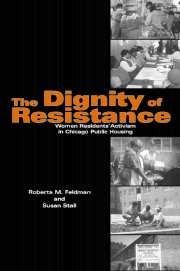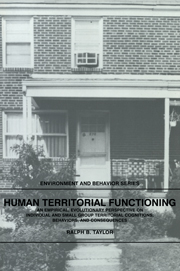4 results in Environment and Behavior

The Environmental Psychology of Prisons and Jails
- Creating Humane Spaces in Secure Settings
-
- Published online:
- 05 October 2012
- Print publication:
- 18 June 2012

Introduction to Configural Frequency Analysis
- The Search for Types and Antitypes in Cross-Classification
-
- Published online:
- 04 August 2010
- Print publication:
- 25 May 1990

The Dignity of Resistance
- Women Residents' Activism in Chicago Public Housing
-
- Published online:
- 06 July 2010
- Print publication:
- 09 February 2004

Human Territorial Functioning
- An Empirical, Evolutionary Perspective on Individual and Small Group Territorial Cognitions, Behaviors, and Consequences
-
- Published online:
- 05 February 2010
- Print publication:
- 26 August 1988

